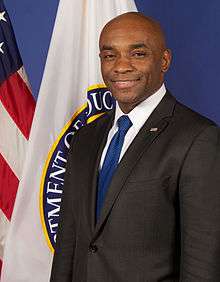United States Deputy Secretary of Education

| Education in the United States |
|---|
|
|
The Deputy Secretary of Education oversees and manages the development of policies in the United States Department of Education. The Deputy Secretary focuses primarily on K–12 education policy, such as No Child Left Behind, the High School Initiative, and the Individuals with Disabilities Education Act.[1] The Deputy Secretary also has responsibility for carrying out the intergovernmental relations of the Department. The Deputy Secretary becomes Acting Secretary of Education in the event of the Secretary's absence, disability, or a vacancy in the Office of Secretary.[2]
The Office of the Deputy Secretary coordinates the work of the Office of Elementary and Secondary Education, the Office of Innovation and Improvement, the Office of English Language Acquisition, the Office of Special Education and Rehabilitative Services, and the Office of Safe and Drug-Free Schools. The Deputy Secretary also oversees the Department's LEP Partnership, the Office for Small and Disadvantaged Business Utilization, and the Department's partnership with The History Channel.[1]
The Deputy Secretary is appointed by the President and confirmed by the United States Senate.[1][2] The Deputy Secretary is paid at level II of the Executive Schedule,[3] meaning as of 2006, he or she receives a basic annual salary of $162,000.[4]
The incumbent acting Deputy Secretary is John King, Jr. Previous deputy secretaries include Anthony Wilder Miller,[5] Raymond Simon (2005–2009), Eugene W. Hickok (2003–2004),[6] William D. Hansen (2001–2003),[7] Frank Holleman (1999-2001),[8] Marshall Smith (1997–1999),[9] Madeleine M. Kunin (1993–1997),[10] and David T. Kearns (1991–1993).[11]
List of Deputy Secretaries of Education
| # | Name | Term Began | Term Ended | President(s) served under |
|---|---|---|---|---|
| 1 | David T. Kearns | 1991 | 1993 | George H.W. Bush |
| 2 | Madeleine M. Kunin | 1993 | 1997 | Bill Clinton |
| 3 | Marshall Smith | 1997 | 1999 | |
| 4 | Frank Holleman | 1999 | 2001 | |
| 5 | William D. Hansen | 2001 | 2003 | George W. Bush |
| 6 | Eugene W. Hickok | 2003 | 2004 | |
| 7 | Raymond Simon | 2005 | July 24, 2009 | |
| 8 | Anthony Wilder Miller | July 24, 2009 | 2013 | Barack Obama |
| 9 | James H. Shelton III | 2013 | Dec. 2014[12] | |
| 10 | John King, Jr. Acting, Sr. Advisor |
Dec. 2014 | Dec. 2015[13][14] | |
| 11 | James Cole Jr. | January 28, 2016 | Incumbent |
References
- 1 2 3 "Office of the Deputy Secretary: U.S. Department of Education". Retrieved September 27, 2007.
- 1 2 "US CODE: Title 20,3412. Principal officers". Retrieved September 27, 2007.
- ↑ "US CODE: Title 5,5313. Positions at level II". Retrieved September 27, 2007.
- ↑ "SALARY TABLE NO. 2006-EX". Retrieved September 27, 2007.
- ↑ Anthony Wilder Miller, biography
- ↑ Partlow, Joshua (October 8, 2004). "Area Schools Undaunted By Federal Terror Alert". The Washington Post.
- ↑ Burd, Stephen (June 20, 2003). "Deputy Secretary of Education Resigns". The Chronicle of Higher Education.
- ↑ http://clinton6.nara.gov/1999/11/1999-11-12-holleman-named-deputy-secretary-of-department-of-education.html
- ↑ Wilorsen, Jodi (July 17, 2001). "State School Chiefs Fret Over U.S. Plan To Require Testing". The New York Times.
- ↑ Kershaw, Sarah (July 29, 1995). "Noneducators in the Running To Fill Top Education Post". The New York Times.
- ↑ Wines, Michael (May 5, 1992). "RIOTS IN LOS ANGELES: The President; WHITE HOUSE LINKS RIOTS TO WELFARE". The New York Times.
- ↑ U.S. Deputy Ed. Secretary Jim Shelton to Step Down
- ↑ Diane Ravitch
- ↑ Education Secretary Arne Duncan stepping down
